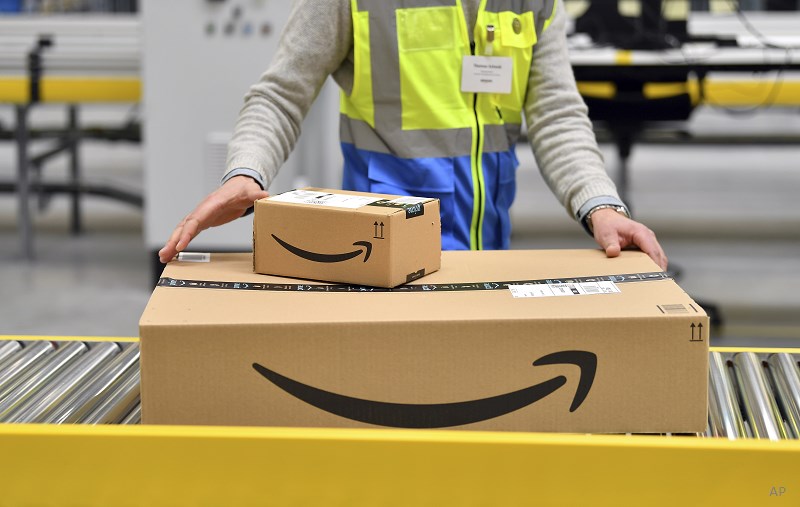
While many companies have been hit hard by the lockdown measures taken by the governments to slow down the spread of the coronavirus, some are set to emerge from the coronavirus crisis stronger than ever.
The Covid-19 crisis has effectively hit the fast-forward button on existing multi-year trends including e-commerce, cloud-computing, online streaming of content and use of social networks. Here are five companies that are thriving in the face of to the pandemic:
Facebook (FB)
Facebook is certainly one of the main beneficiaries of stay-at-home measures: active users have grown to 2.6 billion, beating expectations at some 10% more than the same quarter a year ago.
The trend hardly surprising at a time when people are forced to stay home and try to fight loneliness by reaching out to friends and family over social networks. Facebook is the leader in its field as the largest social network in the world and the titan also owns two other complementary businesses, messaging platform WhatsApp and photo-sharing social network Instagram. In total, nearly 3 billion people used one of the Facebook’s apps in the first quarter of the year.
Morningstar analyst Ali Mogharabi points out that the growth in users and user engagement, along with the valuable data that they generate, makes Facebook attractive to advertisers in the short and long term. “The combination of these valuable assets and expected continuing growth in online advertising bode well for Facebook, as the firm generates strong top-line growth and remains cash flow positive and profitable,” he says. “While utilisation of the data is under scrutiny in different markets, we think Facebook’s large audience size will still attract the ad dollars.”
Meanwhile Dan Smith, international equity analyst at Canaccord Genuity Wealth Management believes that, while the business did see a drop off in advertising revenues during the quarter, any companies looking to increase sales, particularly those transitioning their business to becoming more digital, would use Facebook as a platform to advertise, meaning there could be more growth to come. Rated three stars, Facebook shares currently trade at $194, up nearly 33% from its pandemic-induced lows.
Amazon (AMZN)
Social distancing also means long queues outside shops with one-in-one-out rules in place. This is a boon for e-commerce companies such as Amazon: why go out when you can order something with a click from the comfort of your sofa?
Amazon’s range now also includes food and household essentials, making it a real one-stop-shop for users. Cleverly, the company encourages people to try Prime for free for a month, a period in which customers can get quick and free delivery. Smith says: “Given first users of the service are likely to be impressed with the ease and convenience that Amazon’s online service provides, its likely to lead to a permanent shift in spending habits and an acceleration of the trend towards online spending.
But Amazon’s business doesn’t stop here. The giant owns Audible, Kindle and Prime Video (all subscription-based and offering a free 30-day trial). And what better than an endless library of books and movies while in quarantine?
“Its operational efficiency, network effect, and a brand intangible asset built on customer service provide its marketplaces with sustainable competitive advantages that few, if any, traditional retailers can match,” says Morningstar analyst R.J. Hottovy. “Amazon owns one of the wider economic moats in the consumer sector and is likely to reshape retail, digital media, enterprise software, and other categories for years to come.”
Also rated three stars by Morningstar analysts, Amazon share prices have soared from around $1,900 at the beginning of the year to around $2,370.
Spotify (SPOT)
Swedish-based Spotify is the world’s leading music streaming service provider. And as our daily routines have shifted to working from home, so have our listening habits. The company has announced a spike in cooking- and housework-themed playlists, as well as the ones that help with relaxation and exercising. There has also been an increased interest in news podcasts and Spotify put together a “Covid-19 hub” to help users find everything in one place.
“It’s reassuring to see Spotify continuing to add subscribers to the top of the revenue funnel, with monthly active users growing faster compared to the same time last year,” says Sophie Lund-Yates, equity analyst at Hargreaves Lansdown. “Overall, Spotify is in a better position than many businesses right now, while millions of us are stuck inside, grappling for ways to entertain ourselves and our families, companies like Spotify are well placed to meet that demand.”
Currently trading at around $149, Spotify's shares have climbed around 20% since the stock market falls in March.
Netflix (NFLX)
What’s the best way of spending an evening staying home if not watching a tv series? Streaming service Netflix has reported an increase in subscribers, as the company reaped the rewards of a newly captive audience. Demand for its services has been so strong, the company reduced its picture quality to ensure users wouldn't suffer buffering or blockiness.
“Clearly those under social distancing want to be entertained, and the money that consumers cannot spend in restaurants, bars, cinemas or any other form of entertainment is finding its way to streaming services,” says Smith. He points out that comparing the cost of the monthly subscription to a cinema ticket or the cost of a pint, it clearly offers an attractive value proposition for consumers. The quality and depth of Netflix's content is continuously improving too, helping it attract and retain new customers.
It is unsurprising, then, that the company gained 15.8 million global subscribers in the first quarter of the year, surging ahead of the expectated 7.6 million. It now has a total of 183 million customers.
In US alone, during the week of March 16, people streamed 36% more content compared with three weeks earlier, before the social distancing restrictions took effect.
Morningstar analyst Neil Macker believes “Netflix has morphed into a pioneer in subscription video on demand”. He says: “Our economic moat rating of narrow is based on intangibles and a network effect resulting from the use of Big Data stemming from the firm's massive worldwide subscriber base.”
Alphabet (GOOGL)
Alphabet is the parent company of Google and generates most of its revenue from the search engine business. The most popular search tool in the world, it is benefitting from people spending time surfing the internet. On top of that, the firm owns video-sharing platform YouTube, which has seen traffic soar over the past couple of months.
Social distancing is also leading to growing use of its other services such as Google Hangout, Google Calendar and Google Drive, which many companies use for their employees.
However, Marc Pullen, senior equity analyst at Canaccord Genuity Wealth Management, highlights that a surge in usage does not always mean a corresponding revenue impact. “Google is heavily dependent on advertising revenue, which has fallen significantly since March. Advertising does appear to be now stabilising, albeit at a lower level,” he says. “Fortunately, the company has significant amounts of cash on its balance sheet, so can weather the drop-in advertising revenue.”
Meanwhile, Mogharabi believes Alphabet's revenue diversification is paying off as solid growth in YouTube and cloud services lessened the coronavirus impact on overall revenue: "We continue to expect the current downturn to strengthen Alphabets's network effect moat source as more users remain on Google’s platforms, from which the firm will benefit once the economy turns around. We also applaud the various steps that Alphabet is taking to control costs and improve efficiency during this downturn. It remains on our Best Idea list.”





























